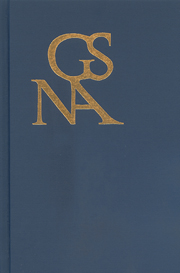Book contents
- Frontmatter
- Contents
- Special Section on Goethe's Lyric Poetry
- Introduction: New Approaches to Goethe's Lyric Poetry
- Intimacy, Morality, and the Inner Problematic of the Lyric
- Beyond the Poem: Strategies of Metapoetic Reflection in Goethe's Erster Weimarer Gedichtsammlung
- Meistersänger als Beruf: The Maieutics of Poetic Vocation in “Erklärung eines alten Holzschnittes …”
- Song or Narration?: Goethe's Mignon
- The Sucking Subject: Structural Ambiguities of Goethe's “Auf dem See” in Literary and Linguistic Perspective
- “Höhere Begattung,” “höhere Schönheit”: Goethe's Homoerotic Poem “Selige Sehnsucht”
- Poetry after Faust
- Forms of Knowledge/Knowledge of Forms: The Epistemology of Goethe's West-östlicher Divan and Cavellian Skepticism
- Im flüßgen Element bin und wieder schweifen: Development and Return in Goethe's Poetry and Hegel's Philosophy
- Goethe's Historical Particularism and the “Right Hand” of History: Early Modern State Building, Nobility, and the Feud in Götz von Berlichingen
- Where Are the Mountains?: Johann Jacob Bodmer and the “Pre-Kantian Sublime”
- The Politics of Aesthetic Humanism: Schiller's German Idea of Freedom
- Romanticism's Old German as Stepping-Stone to Goethe's World Literature
- Book Reviews
Song or Narration?: Goethe's Mignon
from Special Section on Goethe's Lyric Poetry
Published online by Cambridge University Press: 05 October 2013
- Frontmatter
- Contents
- Special Section on Goethe's Lyric Poetry
- Introduction: New Approaches to Goethe's Lyric Poetry
- Intimacy, Morality, and the Inner Problematic of the Lyric
- Beyond the Poem: Strategies of Metapoetic Reflection in Goethe's Erster Weimarer Gedichtsammlung
- Meistersänger als Beruf: The Maieutics of Poetic Vocation in “Erklärung eines alten Holzschnittes …”
- Song or Narration?: Goethe's Mignon
- The Sucking Subject: Structural Ambiguities of Goethe's “Auf dem See” in Literary and Linguistic Perspective
- “Höhere Begattung,” “höhere Schönheit”: Goethe's Homoerotic Poem “Selige Sehnsucht”
- Poetry after Faust
- Forms of Knowledge/Knowledge of Forms: The Epistemology of Goethe's West-östlicher Divan and Cavellian Skepticism
- Im flüßgen Element bin und wieder schweifen: Development and Return in Goethe's Poetry and Hegel's Philosophy
- Goethe's Historical Particularism and the “Right Hand” of History: Early Modern State Building, Nobility, and the Feud in Götz von Berlichingen
- Where Are the Mountains?: Johann Jacob Bodmer and the “Pre-Kantian Sublime”
- The Politics of Aesthetic Humanism: Schiller's German Idea of Freedom
- Romanticism's Old German as Stepping-Stone to Goethe's World Literature
- Book Reviews
Summary
This short piece wishes to engage a large question, namely, the question of how the specific story a poem tells relates to the ways in which poetry emotionally engages its readers. Obviously, this is too large a question to allow for a clear and satisfactory answer. And yet, poetry stands at a peculiar intersection since it usually contains some specific story or rudimentary narrative while also evoking sentiments in the reader or listener who can recognize himself or herself in the poem. I do not wish to suggest that empathy or identification is the key mechanism we need to consider. instead I want to ask why and how poetry is able to address everyone, even while telling a rather discrete tale. How can poetry speak to all when telling about only one? More simply: How can the universal and the singular come together in reading poetry? I believe that the answer to this question lies in effects prior to or outside of mechanisms of empathy—at least this is what I will suggest by means of example. The example, of course, is not a neutral one, for there are no neutral examples. The example or case I will discuss is that of Goethe's Mignon, and more specifically her song “Kennst du das Land.”
Everything about Mignon suggests simplicity, but it is precisely her simplicity that makes her most mysterious. Her simplicity may be the result of a mixing of opposites and extremes, as in child and adult, male and female, naïve and wise, nature and culture.
- Type
- Chapter
- Information
- Goethe Yearbook 20 , pp. 79 - 90Publisher: Boydell & BrewerPrint publication year: 2013



